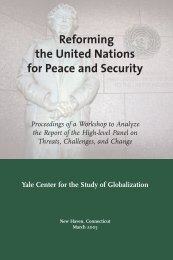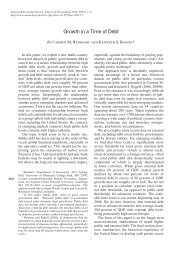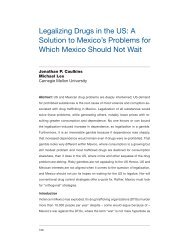The collapse of global trade, murky protectionism, and the crisis:
The collapse of global trade, murky protectionism, and the crisis:
The collapse of global trade, murky protectionism, and the crisis:
Create successful ePaper yourself
Turn your PDF publications into a flip-book with our unique Google optimized e-Paper software.
19. Keep <strong>the</strong> <strong>trade</strong> flowing by cutting red tape<br />
Gerard McLinden<br />
World Bank<br />
<strong>The</strong> current economic <strong>crisis</strong> will lead to <strong>the</strong> first decline in international <strong>trade</strong> in 25<br />
years – pushing millions <strong>of</strong> developing world citizens back into crippling poverty.<br />
Recent protectionist responses are likely to deepen <strong>the</strong> <strong>crisis</strong> <strong>and</strong> delay recovery. G20<br />
pledges to foreswear <strong>protectionism</strong>, or agreements on st<strong>and</strong>stills <strong>and</strong> surveillance as<br />
o<strong>the</strong>r suggest in this book are all useful. But <strong>the</strong> G20 could counter <strong>protectionism</strong><br />
more directly. It could adopt a proactive, pro-<strong>trade</strong> strategy <strong>of</strong> supporting reforms that<br />
cut <strong>the</strong> red tape <strong>and</strong> reduce <strong>the</strong> transaction costs facing <strong>trade</strong>rs around <strong>the</strong> globe.<br />
<strong>The</strong> WTO <strong>trade</strong> facilitation negotiations <strong>of</strong>fer a very practical opportunity to <strong>of</strong>fset<br />
some <strong>of</strong> <strong>the</strong> impact <strong>of</strong> <strong>the</strong> current economic <strong>crisis</strong>. <strong>The</strong> pay<strong>of</strong>f to developing countries<br />
which depend heavily on <strong>trade</strong> could be particularly high.<br />
This chapter explains how <strong>the</strong> current <strong>trade</strong> facilitation negotiations can act as a<br />
positive catalyst for deep <strong>and</strong> meaningful reform in this area.<br />
Trade facilitation as an active counter to falling <strong>trade</strong><br />
Excessively bureaucratic <strong>and</strong> outdated border processing systems <strong>and</strong> procedures as<br />
well as inadequate infrastructure result in high transaction costs for <strong>trade</strong>rs, long<br />
delays <strong>and</strong> unpredictability in <strong>the</strong> clearance <strong>of</strong> goods – <strong>of</strong>ten accompanied by high<br />
levels <strong>of</strong> corruption. Red tape equals lost opportunities. Governments lose because<br />
slow <strong>and</strong> inefficient processes encourage noncompliance <strong>and</strong> fraud, exporters lose<br />
because high costs <strong>and</strong> unreliability make <strong>the</strong>m uncompetitive on regional <strong>and</strong> <strong>global</strong><br />
markets, local manufacturers lose because <strong>the</strong> costs <strong>of</strong> <strong>the</strong>ir imported inputs are too<br />
high <strong>and</strong> unpredictability in supply means <strong>the</strong>y are forced to maintain unnecessarily<br />
high <strong>and</strong> costly inventories, <strong>and</strong> consumers lose because high transaction costs <strong>and</strong><br />
inefficiencies translate into additional prices at <strong>the</strong> shops.<br />
Research suggests that it takes three times as many days, nearly twice as many documents<br />
<strong>and</strong> six times as many signatures to import goods in poor countries than it<br />
does in rich ones (World Bank, Doing Business Report 2007). Africa, in particular,<br />
fares poorly with <strong>the</strong> time taken between <strong>the</strong> submission <strong>of</strong> customs declarations <strong>and</strong><br />
ultimate clearance taking four times longer than in OECD countries (World Bank,<br />
Logistics Performance Index, 2007). Delays, unpredictability <strong>and</strong> high <strong>trade</strong> transaction<br />
costs at <strong>the</strong> border undermine a country's competitiveness, ei<strong>the</strong>r by taxing<br />
imported inputs with deadweight inefficiencies or by adding costs <strong>and</strong> reducing <strong>the</strong><br />
competitiveness <strong>of</strong> exports.<br />
<strong>The</strong> evidence is overwhelming that attention devoted to eliminating unnecessary<br />
red tape, removing opportunities for corruption <strong>and</strong> improving <strong>trade</strong> related infrastructure<br />
is likely to attract investment <strong>and</strong> make small <strong>and</strong> medium sized enterprises<br />
more competitive players in <strong>the</strong> international trading system. For all <strong>the</strong>se reasons<br />
99





